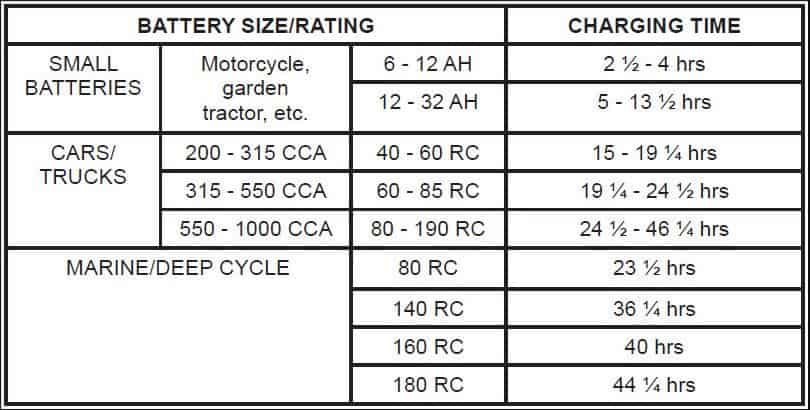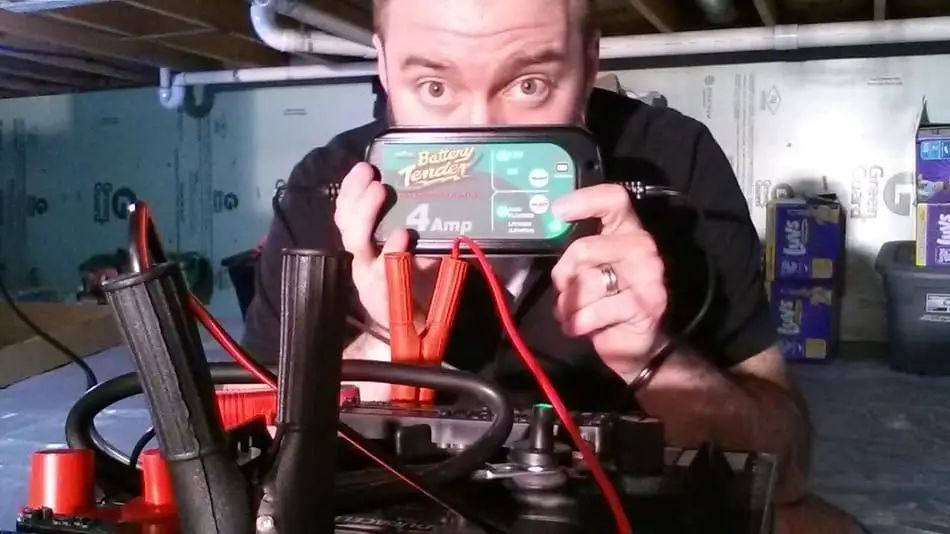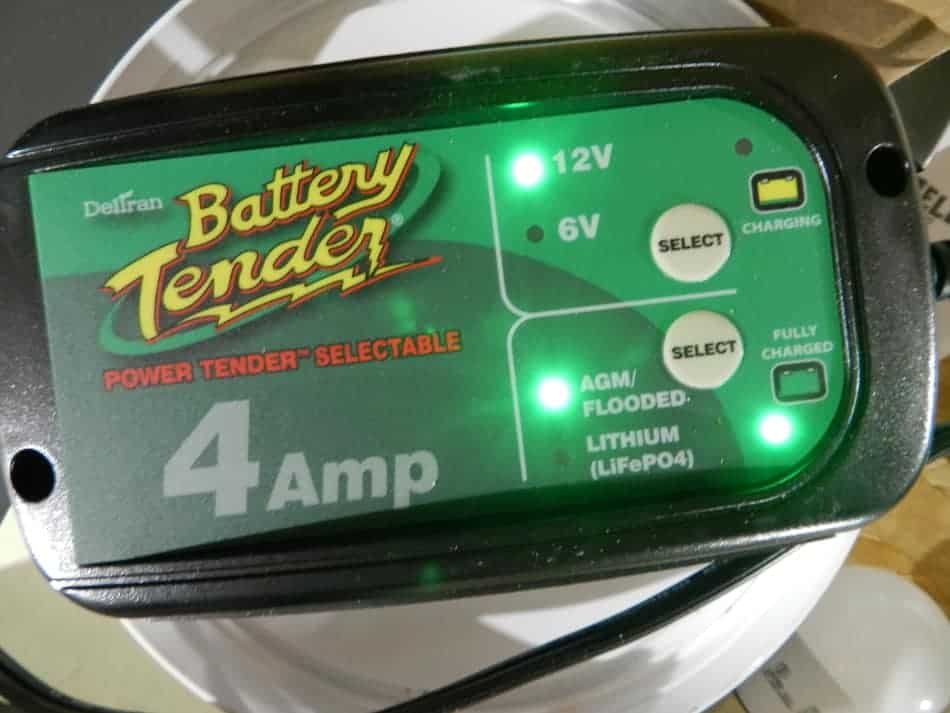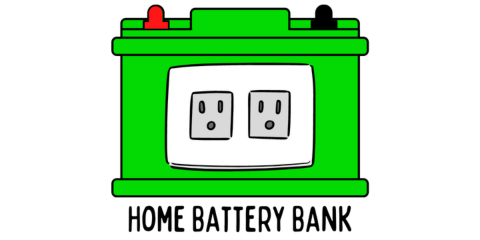If you’re wondering how long it takes to charge your car battery, then you’re likely having a bad day! Knowing how long you might be without a vehicle and making plans around that might make your day a little better though.
A small car battery can be charged in 24 hours at 2 amps, or 5 hours at 10 amps. Mid-sized car batteries can be charged in 31 hours at 2 amps, or 6 hours at 10 amps. Larger vehicle batteries can be charged in 50 hours at 2 amps, or 10 hours at 10 amps.
That’s the simplified answer to give you a ballpark estimate.
⬇⬇⬇ If you clicked on this article needing help with EV battery charged times, I have a full article here that you can access. Just click on the image below. ⬇⬇⬇

In this article, I will be covering how I calculated the numbers in my charts, what type of charger is best for charging your car’s battery, charging your car battery with the car’s alternator, and the length of time to charge a car battery when using commonly available chargers.
If you’re in a hurry though, you can simply use the calculator below to calculate your battery’s charge time. You can also access your charger’s amp rating below for a brief answer or and you can cross-reference your charger with your battery in the charts below for a wider range of charging times.
Calculators to Find 12v Battery Charge Times:
Use the top calculator to calculate your battery’s charge time. You’ll need to know the Ah (amp hours) from the sticker on the battery and you’ll need to know the voltage with a multimeter (set to DC voltage, place the black lead on the negative terminal and the red lead on the positive terminal).
If you only see CCA or RC ratings, use the calculators below this one to convert them to a ballpark Ah rating for the top calculator.
Charging Time Ranges for Car Batteries Rated at: CCA 200-315 / RC 40-60
| Charger Amps | Time in Hours at 50% Discharged | Time in Hours at 100% Discharged (Dead Battery) |
|---|---|---|
| 1.5 Amps | 15-19.25 | 30-38.5 |
| 2 Amps | 11.25-14.44 | 22.5-28.88 |
| 4 Amps | 5.63-7.22 | 11.26-14.44 |
| 5 Amps | 4.5-5.78 | 9-11.56 |
| 6 Amps | 3.75-4.81 | 7.5-9.62 |
| 8 Amps | 2.81-3.61 | 5.62-7.22 |
| 10 Amps | 2.25-2.89 | 4.5-5.78 |
| 15 Amps | 1.5-1.93 | 3-3.86 |
| 20 Amps | 1.13-1.44 | 2.26-2.88 |
| 25 Amps | 0.9-1.16 | 1.8-2.32 |
| 30 Amps | 0.75-0.96 | 1.5-1.92 |
| 40 Amps | 0.56-0.72 | 1.12-1.44 |
| 50 Amps | 0.45-0.58 | 0.9-1.16 |
Charging Time Ranges for Car Batteries Rated at: CCA 315-550 / RC 60-85
| Charger Amps | Time in Hours at 50% Discharged | Time in Hours at 100% Discharged (Dead Battery) |
|---|---|---|
| 1.5 Amps | 19.25-24.5 | 38.5-49 |
| 2 Amps | 14.44-18.38 | 28.88-36.76 |
| 4 Amps | 7.22-9.19 | 14.44-18.38 |
| 5 Amps | 5.78-7.35 | 11.56-14.7 |
| 6 Amps | 4.81-6.13 | 9.62-12.26 |
| 8 Amps | 3.61-4.59 | 7.21-9.18 |
| 10 Amps | 2.89-3.68 | 5.78-7.36 |
| 15 Amps | 1.93-2.45 | 3.86-4.9 |
| 20 Amps | 1.44-1.84 | 2.88-3.68 |
| 25 Amps | 1.16-1.47 | 2.32-2.94 |
| 30 Amps | 0.96-1.23 | 1.92-2.46 |
| 40 Amps | 0.72-0.92 | 1.44-1.84 |
| 50 Amps | 0.58-0.74 | 1.16-1.48 |
Charging Time Ranges for Car Batteries Rated at: CCA 550-1000 / RC 85-190
| Charger Amps | Time in Hours at 50% Discharged (Single Amp Output) | Time in Hours at 100% Discharged (Single Amp Output) |
|---|---|---|
| 1.5 A | 24.5-46.25 | 49-92.5 |
| 2 A | 18.38-34.69 | 36.76-69.38 |
| 4 A | 9.19-17.34 | 18.38-34.68 |
| 5 A | 7.35-13.88 | 14.7-27.76 |
| 6 A | 6.13-11.56 | 12.26-23.12 |
| 8 A | 4.59-8.67 | 9.18-17.34 |
| 10 A | 3.68-6.94 | 7.36-13.88 |
| 15 A | 2.45-4.63 | 4.9-9.26 |
| 20 A | 1.84-3.47 | 3.68-6.94 |
| 25 A | 1.47-2.78 | 2.94-5.56 |
| 30 A | 1.23-2.31 | 2.46-4.62 |
| 40 A | 0.92-1.73 | 1.84-3.46 |
| 50 A | 0.74-1.39 | 1.48-2.78 |
How I Estimated the Charging Times for Each Charger and Battery
When I did the calculations above, I borrowed the initial set-up of the chart from Schumacher which is a battery charger manufacturer. I essentially extrapolated their chart that they use for their 1.5 amp charger to get a baseline for all of the other values.
The charts have ranges depending on the CCA (cold cranking amps) or RC (reserve capacity) of your car battery. Your car battery’s rating will be on the sticker on the top of the battery.
After you locate where your car battery’s rating fits, you will see an estimate for the charging time depending on whether or not it is completely dead (100% discharged) or half dead (50% discharged).
In the chart seen here (which assumes that you are only recharging a battery from 50% – not dead), you’ll notice that the first two categories are in Amp Hours (Ah) but that car batteries are rated in Cold Cranking Amps (CCA) or Reserve Capacity (RC).

In order to estimate how long a charger will take to charge, we need to get the car batteries to an Ah equivalent rating because, for example, a 4-amp charger, will generally replenish 4Ah within a battery per hour (not including inefficiencies).
In order to see how Schumacher (a battery charger manufacturer) treats the different classes of car batteries with regards to AH, I did a little math.
Let’s take the 32Ah battery from the image above. It says that a time of 13.5 hours is needed to bring a 32Ah battery back to full charge from 50%.
32Ah / 2 = 16Ah that needs to be replaced. 16Ah / 13.5 hours = 1.19 amps per average hour from the 1.5 amp charger.
The 12Ah battery right next to it on the image needs 6 amp hours recharged (at 50%) and it says it takes 5 hours to do so. So, 6Ah/5 hours = 1.2 amps per average hour from the 1.5 amp charger.
The 6Ah battery in the image needs 3Ah recharged, so 3Ah/2.5 hours = 1.2 amps per average hour from the 1.5 amp charger.
Seeing a trend?
One of the reasons it averages out to 1.2 amps per hour instead of 1.5 is the increasing internal resistance from the car battery as it approaches full charge.
Essentially, we have an 80% charging efficiency (or 20% inefficiency) because 1.2/1.5 = 0.8
With the given examples, they all lead to this formula: “X”AH /time of charge listed = 1.2
If we apply the same logic to the CCA/RC batteries, we can see that it takes 19.25 hours to charge a 315CCA or 60RC battery from 50%. To get the AH, I do: X / 19.25 = 1.2 ==> X = 1.2 * 19.25 ==> X = 23.1AH ==> 23.1 * 2 = 46.2AH.
A 315CCA or 60RC battery is a 46.2AH equivalent.
I continued to do all of this math for all of the values and reached 36AH – 46.2AH, 46.2AH – 58.8AH, and 58.8AH – 111AH for the battery ranges for Car/Truck batteries.
| CCA: 200-315 RC: 40-60 | CCA: 315-550 RC: 60-80 | CCA: 550-1,000 RC: 80-190 |
|---|---|---|
| 36-46.2 Ah | 46.2-58.8 Ah | 58.8 – 111 Ah |
Once that was done, you simply take any of the values, calculate the percentage of Ah that needs to be recharged, divide it by 0.8 (the charging efficiency), and then divide it by the number of amps of the charger.
Here is a chart that indicates the state of charge depending on the voltage.
Percent of Battery Charge Remaining by Voltage
| 100% | 12.65+ |
| 90% | 12.5 |
| 80% | 12.42 |
| 70% | 12.32 |
| 60% | 12.20 |
| 50% | 12.1 |
| 40% | 11.9 |
| 30% | 11.75 |
| 20% | 11.6 |
| 10% | 11.3 |
| 0% | 10.5 |
Limitations with the Results
Of course, these are all estimations that do try to factor in inefficiencies but battery science is extremely complex and full of theories, laws, and estimations.
Limitations to these results could be from any of the following: internal resistance, heat, the age of the battery, the specific gravity of each of the cells, the sulfation level on the plates, the true output of the charger, and more.
The purpose of this chart was to extrapolate what Schumacher (an actual manufacturer of battery chargers) provided. It isn’t perfect, but it is certainly a solid ballpark estimation of the charging times.
My 12v Smart Charger won’t Detect My Car Battery
This is a problem you might run into if you really let your car battery completely discharge. This type of battery is nothing but an overly heavy paperweight.
It’s usually an easy problem to remedy if you can get a jump from another car.
The reason your smart charger won’t begin the charging process is because of its built-in safety feature.
Most smart chargers won’t pass current through their cables until a minimum voltage is detected first from a battery. This is so that the charger won’t attempt to pass on a charge if you hook the cables to the wrong terminals or whatnot.
The 12-volt smart charger needs to detect a minimum voltage in the battery to begin charging (generally 9.5-10.5, depending on the manufacturer). Safely connect jumper cables from a running car with a good battery to the fully discharged battery for a few minutes and rev the engine a little to increase amperage. Safely disconnect the jumper cables and connect the charger.
If this doesn’t work, you can repeat the process a couple of times for longer durations when connected to the donor vehicle.
I’ve brought a few batteries back to life in this manner that were undetectable by smart chargers.
Is a Higher Amp Charger OK to Use for my Car Battery?
I would heavily discourage using a charger greater than 10 amps when charging a car battery. In fact, I would stay in the 2 to 8 amp range. I think 5-amps is the sweet spot when it comes to vehicle batteries. If you have a truck, you might get away with a 10 or 15 amp charger, but a lower one would still be healthier for your battery.
Batteries will tend to overheat, overcharge, and “boil” electrolyte off when they are receiving an amperage greater than 25% of their total amp hour rating.
Most car batteries are in the range of 40 to 70 amp hour equivalency. Truck batteries and other larger vehicles or those with lots of electronics might get up in the 80 amp hour equivalency range or higher.
If you have a 50AH battery and you hook a 30 amp charger to it, you are risking overheating it, warping the plates, and losing electrolyte solution through evaporation due to electrolysis. It also increases the production of hydrogen gas (explosive) and hydrogen sulfide (H2S, noxious).
A slower charge gives the plates in the battery more time with less stress to convert electrical energy from your charger into chemical energy.
It might take an extra hour or two, but it’s worth it for a healthy battery.
If you’re looking for a solid charger and/or maintainer, I recommend this 5-amp charger from Amazon. It is gentle on your car battery, can charge it overnight, and can be left connected indefinitely for long-term storage!

Mine has lasted for over 6 years now while running 365 days a year, without malfunction, and I can rest assured that it’s never overcharging my battery and only providing it with the amount of current that it can accept.
Will a Trickle Charger Overcharge my Car Battery?
Yes, a trickle charger that is not a “smart charger” operating in “float” mode will eventually ruin your battery if left connected over time. Trickle chargers continue to pump a small current into the battery even if the battery can’t accept it. This slowly evaporates the electrolyte through electrolysis (overcharging).
If you have an older trickle charger, be sure to remove the cables shortly after the battery has reached its full charge.
If you have a modern smart charger that has a “float” or “maintain” mode, you can leave these hooked up indefinitely, as they only give out current when the battery naturally self-discharges.

Do Car Batteries Charge While Idling?
Car batteries do charge while idling but it isn’t an ideal way of charging a 50% or more discharged battery. Running your car at idle for the purpose of charging your battery just creates excess heat under your hood as your alternator and voltage regulator work harder without the cooling effects of air circulation like when driving.
The best thing to do if you have a discharged battery is to hook it up to a proper smart charger.
Let’s face it though, most of us have tried to recharge a battery at idle after a jump. If you’re going to do it, try to leave the car running for at least 20-40 minutes and turn off all unnecessary accessories (AC, radio, lights, etc.).
I ran a test to find out how long it would take to charge a 50% battery by running it at idle, and you can check out the results here.
How Long Does it Take to Charge a Car Battery from Dead?
From dead (fully discharged) it would take a small car battery about 25 hours, a larger car or small SUV battery 32 hours, or a larger SUV and Truck about 48 hours to fully charge on a 2-amp charge. The same batteries could be charged in about 12 hours, 16 hours, and 24 hours with a 4-amp charge, respectively.
If the battery is completely discharged, you will likely need to jump the battery from another vehicle for a few minutes first to give it a temporary spike in voltage so that a smart charger can recognize the battery.
Without doing so will result in a smart charger not recognizing a battery and current will not flow.
How Long do you need to Drive a Car to Recharge a Dead Battery?
After jumping a dead battery, drive at least 30 minutes to allow the alternator to bring the battery back to an acceptable level so that it will start again on its own. If you have access to a smart charger, it’s best to hook your car battery to it as soon as possible to bring the battery to a healthy state.
How Long Does it Take to Charge a Car Battery with a Trickle Charger?
A 1.5 amp trickle charger can charge a 50% discharged small car battery (200-315 CCA or RC 40-60) in about 15 to 19 hours, a mid-sized battery (315-550 CCA or RC 60-85) in 19 to 25 hours, or a large car battery (550-1,000 CCA or RC 85-190) in 24 to 46 hours. Double these times if the battery is fully discharged.
How long to Charge a Car Battery at 2 Amps?
A 2 amp trickle charger can charge a 50% discharged small car battery (200-315 CCA or RC 40-60) in about 11 to 14 hours, a mid-sized battery (315-550 CCA or RC 60-85) in 14 to 18 hours, or a large car battery (550-1,000 CCA or RC 85-190) in 18 to 35 hours. Double these times if the battery is fully discharged.
How long to Charge a Car Battery at 4 Amps
A 4 amp charger can charge a 50% discharged small car battery (200-315 CCA or RC 40-60) in about 6 to 7 hours, a mid-sized battery (315-550 CCA or RC 60-85) in 7 to 9 hours, or a large car battery (550-1,000 CCA or RC 85-190) in 9 to 17 hours. Double these times if the battery is fully discharged.
How long to Charge a Car Battery at 6 Amps
A 6 amp charger can charge a 50% discharged small car battery (200-315 CCA or RC 40-60) in about 4 to 5 hours, a mid-sized battery (315-550 CCA or RC 60-85) in 5 to 6 hours, or a large car battery (550-1,000 CCA or RC 85-190) in 6 to 12 hours. Double these times if the battery is fully discharged.
How long to Charge a Car Battery at 8 Amps
An 8 amp charger can charge a 50% discharged small car battery (200-315 CCA or RC 40-60) in about 3 to 4 hours, a mid-sized battery (315-550 CCA or RC 60-85) in 4 to 5 hours, or a large car battery (550-1,000 CCA or RC 85-190) in 5 to 9 hours. Double these times if the battery is fully discharged.
How long to Charge a Car Battery at 10 Amps
A 10 amp charger can charge a 50% discharged small car battery (200-315 CCA or RC 40-60) in about 2 to 3 hours, a mid-sized battery (315-550 CCA or RC 60-85) in 3 to 4 hours, or a large car battery (550-1,000 CCA or RC 85-190) in 4 to 7 hours. Double these times if the battery is fully discharged.
How long to Charge a Car Battery at 15 Amps
A 15 amp charger can charge a 50% discharged small car battery (200-315 CCA or RC 40-60) in about 2 hours, a mid-sized battery (315-550 CCA or RC 60-85) in 2.25 hours, or a large car battery (550-1,000 CCA or RC 85-190) in 2.5 hours. Double the times if 100% discharged. 15 amp chargers should be used with caution.
15 amp chargers are starting to push the car battery past its ability to absorb all of the current from the charging process. This leads to overheating, the boiling-off of the electrolyte or worse.
It is recommended to use a 3-stage smart charger with a max output of 15 amps if you are going to go this route so that the charger will detect when it needs to scale down the amperage.
15 amp hour chargers would be acceptable for larger deep-cycle batteries, but are a little strong for starting batteries like those in your vehicle.
How long to Charge a Car Battery at 20 Amps
A 20 amp charger can charge a 50% discharged small car battery (200-315 CCA or RC 40-60) in 1.5 hours, a mid-sized battery (315-550 CCA or RC 60-85) in 2 hours, or a large car battery (550-1,000 CCA or RC 85-190) in 2 hours. Double the times if 100% discharged. It’s not recommended to use this large of a charger.
20 amp chargers are pushing the car battery past its ability to absorb all of the current from the charging process. This leads to overheating, the boiling-off of the electrolyte or worse.
Only use a 20 amp smart charger on the starter batteries on the high end of the scale – and use only with great caution.
How long to Charge a Car Battery at 30 Amps
A 30 amp charger can charge a 50% discharged small car battery (200-315 CCA or RC 40-60) in about 1 hour, a mid-sized battery (315-550 CCA or RC 60-85) in 1 hour, or a large car battery (550-1,000 CCA or RC 85-190) in 2 hours. Double the times if 100% discharged. It’s not recommended to use this large of a charger.
30 amp chargers give off an amperage at more than 50% of the estimated amp hours of a typical starting battery and could be hazardous and shorten the lifespan of your battery.
Use a 30 amp charger at your own risk.
How long to Charge a Car Battery at 40 Amps
A 40 amp charger can charge a 50% discharged small car battery (200-315 CCA or RC 40-60) in about 45 minutes, a mid-sized battery (315-550 CCA or RC 60-85) in 1 hour, or a large battery (550-1,000 CCA or RC 85-190) in 1.5 hours. Double the times if 100% discharged. Do not use this large of a charger for car batteries.
40 amp chargers give off an amperage at nearly 100% of the estimated amp hours of a typical starting battery and may be hazardous and shorten the lifespan of your battery.
Risk of overcharging, out-gasing of hydrogen and hydrogen sulfide at large levels can be expected. Structural damage to the battery is a great possibility.
How long to Charge a Car Battery at 50 Amps
A 50 amp charger can charge a 50% discharged small car battery (200-315 CCA or RC 40-60) in 45 minutes, a mid-sized battery (315-550 CCA or RC 60-85) in 45 minutes, or a large battery (550-1,000 CCA or RC 85-190) in 1 hour. Double the times if 100% discharged. Do not use this large of a charger for car batteries.
40 amp chargers give off an amperage at 100+% of the estimated amp hours of a typical starting battery and might be hazardous and shorten the lifespan of your battery.
The risk of overcharging, out-gassing of hydrogen and hydrogen sulfide at large levels can be expected. Structural damage to the battery is a great possibility.

